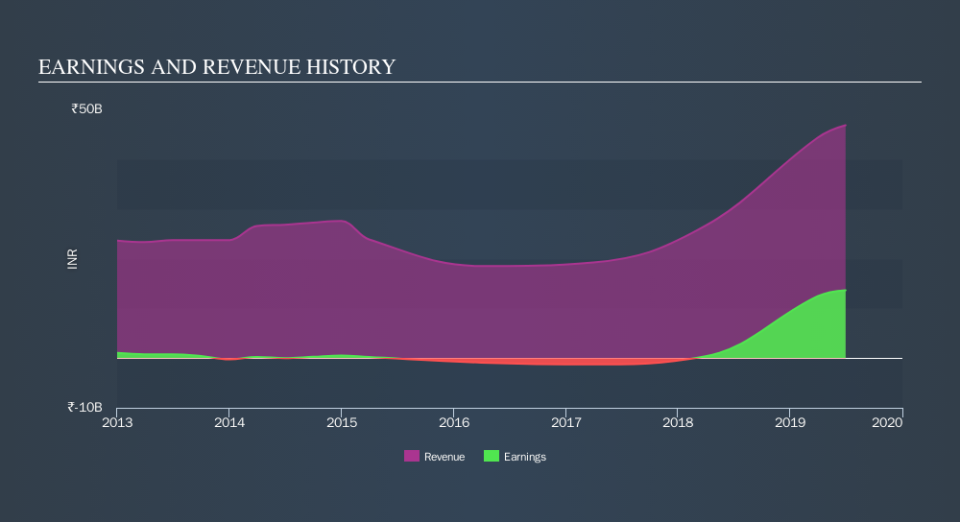Introducing Bombay Dyeing and Manufacturing (NSE:BOMDYEING), The Stock That Dropped 40% In The Last Year

Investors can approximate the average market return by buying an index fund. But if you buy individual stocks, you can do both better or worse than that. That downside risk was realized by The Bombay Dyeing and Manufacturing Company Limited (NSE:BOMDYEING) shareholders over the last year, as the share price declined 40%. That's well bellow the market return of 4.0%. On the bright side, the stock is actually up 13% in the last three years. The falls have accelerated recently, with the share price down 31% in the last three months.
See our latest analysis for Bombay Dyeing and Manufacturing
To quote Buffett, 'Ships will sail around the world but the Flat Earth Society will flourish. There will continue to be wide discrepancies between price and value in the marketplace...' One flawed but reasonable way to assess how sentiment around a company has changed is to compare the earnings per share (EPS) with the share price.
During the unfortunate twelve months during which the Bombay Dyeing and Manufacturing share price fell, it actually saw its earnings per share (EPS) improve by 306%. Of course, the situation might betray previous over-optimism about growth.
It's surprising to see the share price fall so much, despite the improved EPS. But we might find some different metrics explain the share price movements better.
Bombay Dyeing and Manufacturing's revenue is actually up 51% over the last year. Since the fundamental metrics don't readily explain the share price drop, there might be an opportunity if the market has overreacted.
You can see how earnings and revenue have changed over time in the image below (click on the chart to see the exact values).
Balance sheet strength is crucial. It might be well worthwhile taking a look at our free report on how its financial position has changed over time.
What about the Total Shareholder Return (TSR)?
We'd be remiss not to mention the difference between Bombay Dyeing and Manufacturing's total shareholder return (TSR) and its share price return. The TSR is a return calculation that accounts for the value of cash dividends (assuming that any dividend received was reinvested) and the calculated value of any discounted capital raisings and spin-offs. Bombay Dyeing and Manufacturing's TSR of was a loss of 39% for the year. That wasn't as bad as its share price return, because it has paid dividends.
A Different Perspective
While the broader market gained around 4.0% in the last year, Bombay Dyeing and Manufacturing shareholders lost 39% (even including dividends) . Even the share prices of good stocks drop sometimes, but we want to see improvements in the fundamental metrics of a business, before getting too interested. Longer term investors wouldn't be so upset, since they would have made 2.3%, each year, over five years. If the fundamental data continues to indicate long term sustainable growth, the current sell-off could be an opportunity worth considering. Before spending more time on Bombay Dyeing and Manufacturing it might be wise to click here to see if insiders have been buying or selling shares.
But note: Bombay Dyeing and Manufacturing may not be the best stock to buy. So take a peek at this free list of interesting companies with past earnings growth (and further growth forecast).
Please note, the market returns quoted in this article reflect the market weighted average returns of stocks that currently trade on IN exchanges.
We aim to bring you long-term focused research analysis driven by fundamental data. Note that our analysis may not factor in the latest price-sensitive company announcements or qualitative material.
If you spot an error that warrants correction, please contact the editor at editorial-team@simplywallst.com. This article by Simply Wall St is general in nature. It does not constitute a recommendation to buy or sell any stock, and does not take account of your objectives, or your financial situation. Simply Wall St has no position in the stocks mentioned. Thank you for reading.

